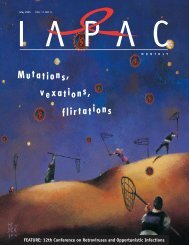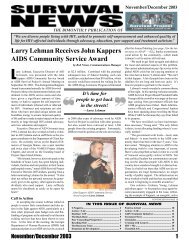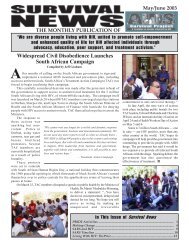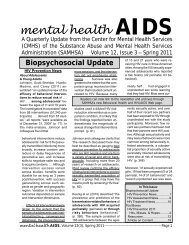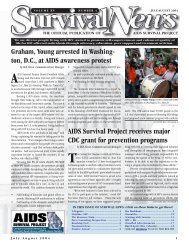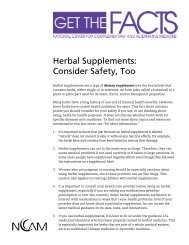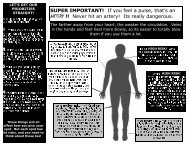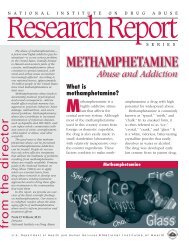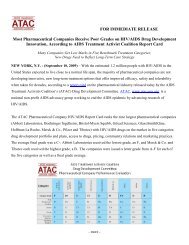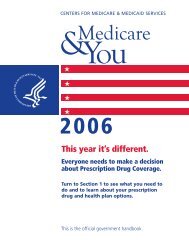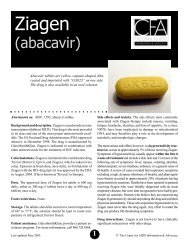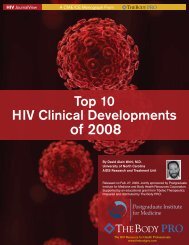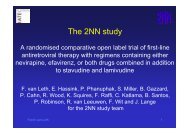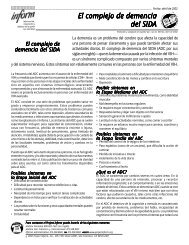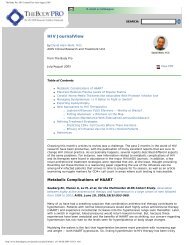HeAlTH INFormATioN & VieWs - CD8 T cells - The Body
HeAlTH INFormATioN & VieWs - CD8 T cells - The Body
HeAlTH INFormATioN & VieWs - CD8 T cells - The Body
Create successful ePaper yourself
Turn your PDF publications into a flip-book with our unique Google optimized e-Paper software.
Labrador<br />
Friendship Centre<br />
Happy valley-Goose Bay<br />
Newfoundland and labrador<br />
Tucked into the small town of Happy Valley-<br />
Goose Bay, on the ruggedly beautiful east coast<br />
of Canada, the Labrador Friendship Centre has<br />
been offering services to Metis, Inuit and Innu<br />
people in the area since 1974. <strong>The</strong> Friendship<br />
Centre’s vibrant HIV/AIDS Labrador Project<br />
opened in 2000 in response to the Labrador<br />
HIV/AIDS Surveillance Study, which found a gap<br />
in knowledge about HIV among Aboriginal communities<br />
in the area, and out of a strong desire<br />
to educate as many people as possible about HIV<br />
and AIDS.<br />
By conducting outreach and workshops at<br />
events around the region as well as visiting<br />
schools and communities, the HIV/AIDS Project<br />
continues to thrive. It has built strong relationships<br />
with NunatuKavut (the Labrador Metis<br />
Nation) and other local networks to plan prevention<br />
programming. <strong>The</strong> HIV/AIDS Project is<br />
dedicated to increasing participants’ comfort in<br />
discussing sexuality and drug use while connecting<br />
them to the wide range of services<br />
offered at the Friendship Centre.<br />
www.lfchvgb.ca<br />
sdiamond@lfchvgb.ca<br />
709.896.5144<br />
Native Women’s Shelter of Montreal<br />
<strong>The</strong> Native Women’s Shelter of Montreal has been<br />
offering shelter and support to Aboriginal women and their<br />
children since 1987. As part of its constantly evolving services,<br />
it created the Holistic Health Project—a program to<br />
support women affected by homelessness, the sex<br />
trade, HIV, substance use and family violence—<br />
that is open to all Aboriginal women, regardless<br />
of status. Its activities include a quilting project<br />
designed to raise awareness and break<br />
stigma around HIV and sessions with Aboriginal<br />
Elders who provide traditional teachings<br />
on health. “<strong>The</strong> Project really focuses on finding<br />
balance between the four aspects of<br />
health—spiritual, emotional, physical and<br />
mental,” says project leader Carrie Martin.<br />
Vancouver Native<br />
Health Society<br />
From the street it’s easy to miss this unassuming grey building,<br />
but the Vancouver Native Health Society (VNHS) has become a centre<br />
of support for Aboriginal people in the city. Established in the<br />
Downtown Eastside in 1991, this stable and well-respected organization<br />
provides frontline care to over 1,500 people living with HIV,<br />
many of whom are struggling with issues of addiction, homelessness,<br />
mental health and poverty. <strong>The</strong> Society uses the medicine<br />
wheel in its holistic approach to the complex lives of its clients.<br />
<strong>The</strong> Positive Outlook Program for people with HIV offers activities<br />
that address participants’ physical, spiritual, mental and emotional<br />
needs and guides the creation of trusting relationships<br />
between clients and healthcare services around the city.<br />
Every Wednesday, more than 50 women connect over a healthy<br />
meal and some lively conversation. A play area for children, free<br />
haircuts, manicures and clothing are also part of this supportive<br />
program. <strong>The</strong> Dudes’ Group, a unique space for men to trade stories<br />
and wisdom while sharing a meal, is another one of the<br />
agency’s success stories. Offered every second Thursday, it consistently<br />
draws nearly 60 male clients. Primary healthcare is offered to<br />
all the women and men who attend the groups.<br />
VNHS staff approach their work with a deep respect for First<br />
Nations cultures. Its welcoming drop-in as well as its food bank,<br />
counselling, a program to help people with HIV stick to their pilltaking<br />
schedules and on-site physicians, nurses and social workers<br />
allow clients to get what they need in a place they trust.<br />
www.vnhs.net<br />
604.254.9949<br />
Two years ago, the shelter set up an onsite medical<br />
clinic, which includes testing for HIV, hepatitis C and other<br />
sexually transmitted infections (STIs). When a woman tests<br />
positive, Martin works with her to seek medical<br />
care at a local clinic. <strong>The</strong> Project also<br />
presents workshops on HIV, hep C and<br />
STIs and hosts talking circles for<br />
women who use substances.<br />
www.nwsm.info<br />
514.933.4688 or 1.866.403.4688<br />
Aboriginal people living with HIV<br />
can also check in with the Native<br />
Friendship Centre of Montreal.<br />
www.nfcm.org or 514.499.1854<br />
Summer 2012 THE POSITIVE SIDE<br />
5



